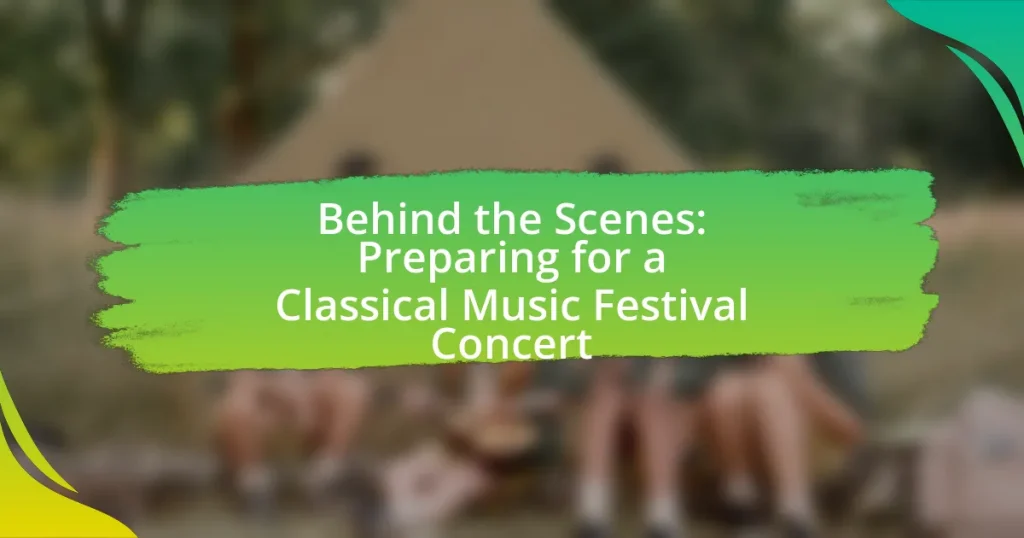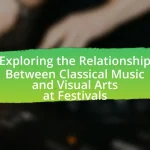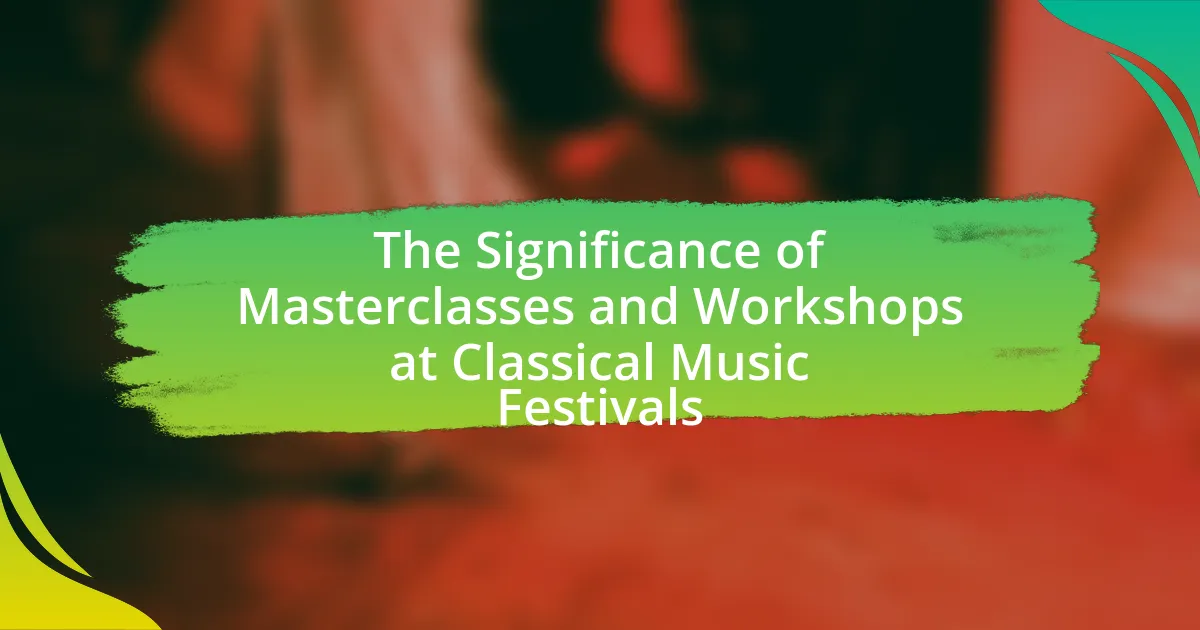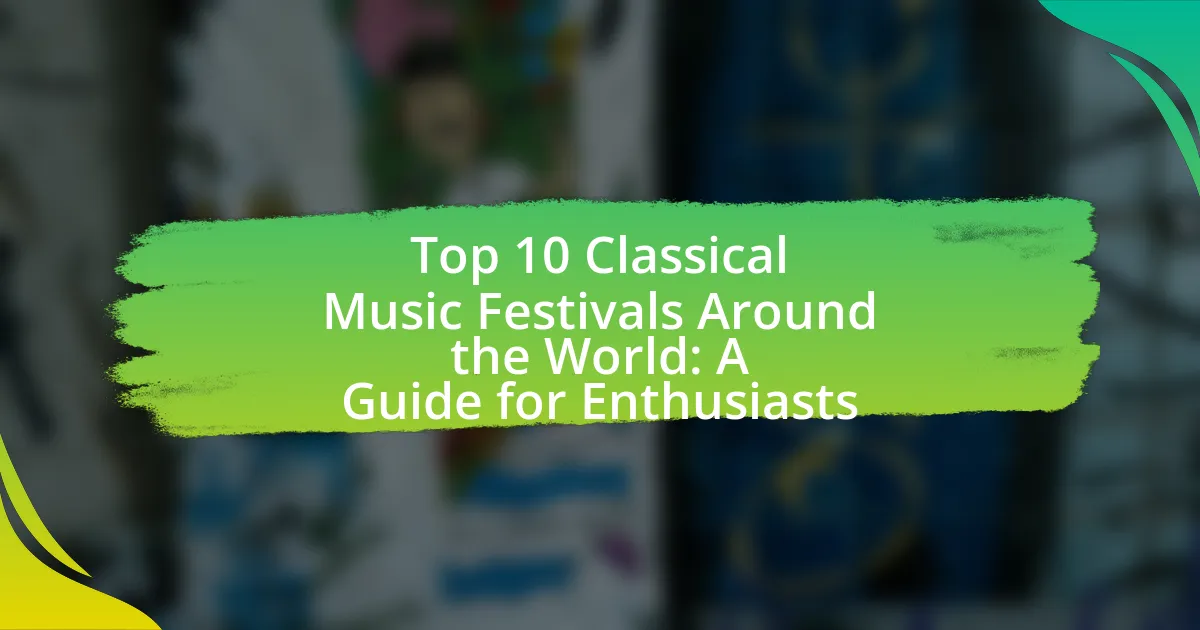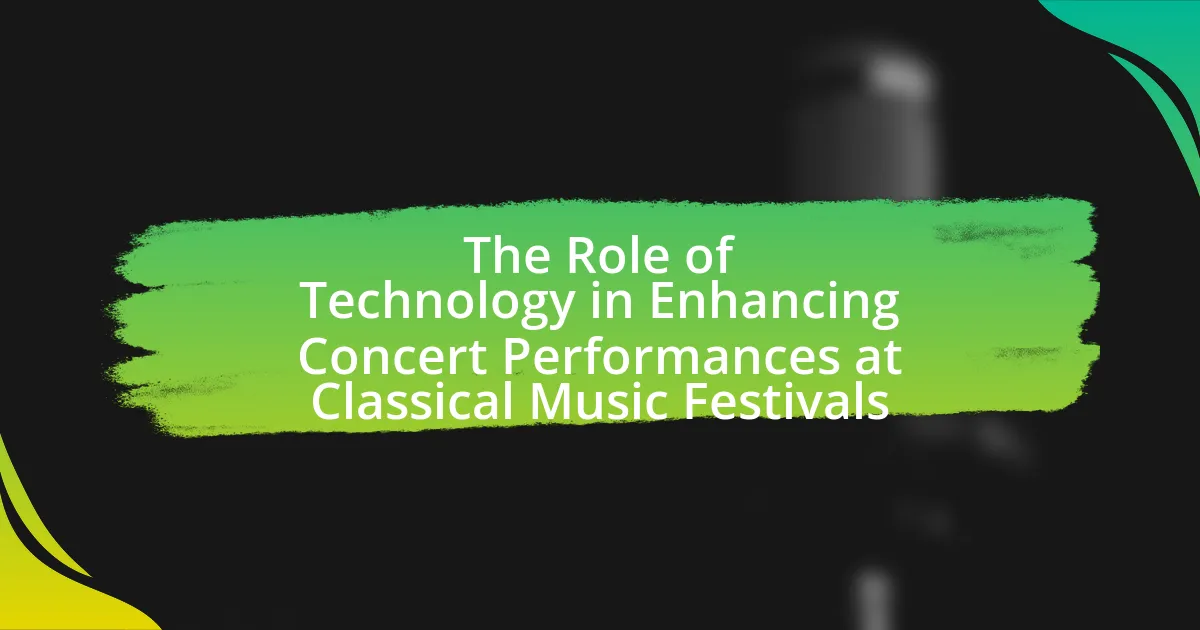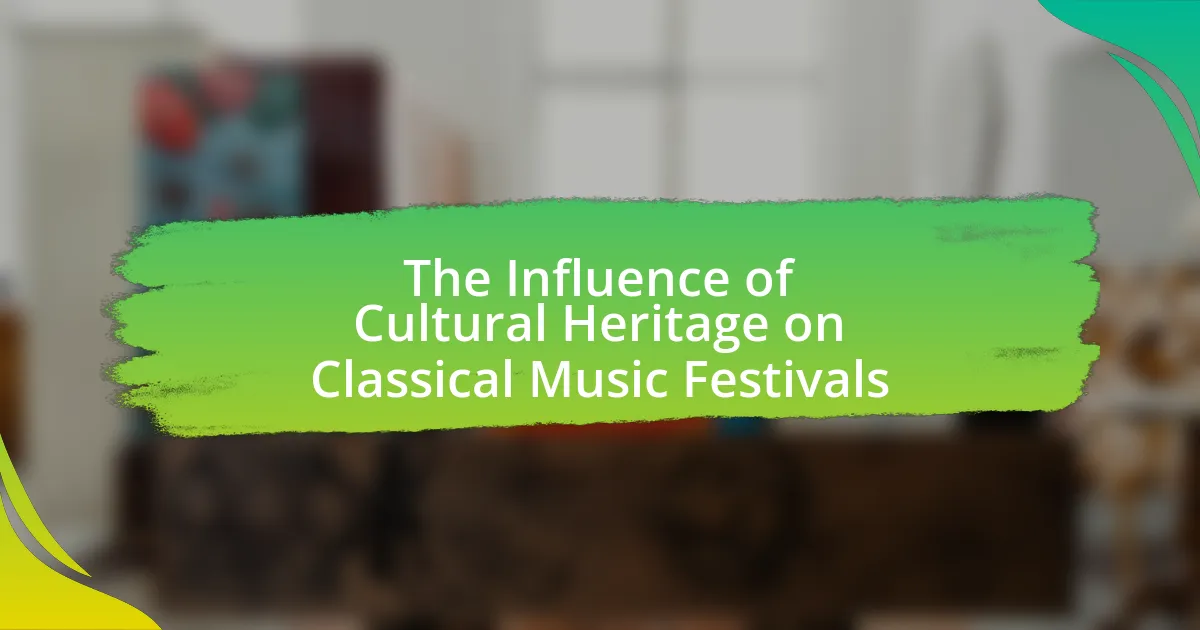The article focuses on the essential elements involved in preparing for a classical music festival concert, emphasizing venue selection, artist coordination, program planning, logistics management, and audience engagement strategies. It discusses how venue choice and logistical considerations impact concert preparation, including factors like location, capacity, and acoustics. The article also highlights the roles of musicians in the preparation process, the importance of marketing and promotion, and the challenges faced during planning, such as budget constraints and logistical issues. Best practices for ensuring a successful concert day experience, including effective communication and audience management, are also outlined, providing a comprehensive overview of the concert preparation process.
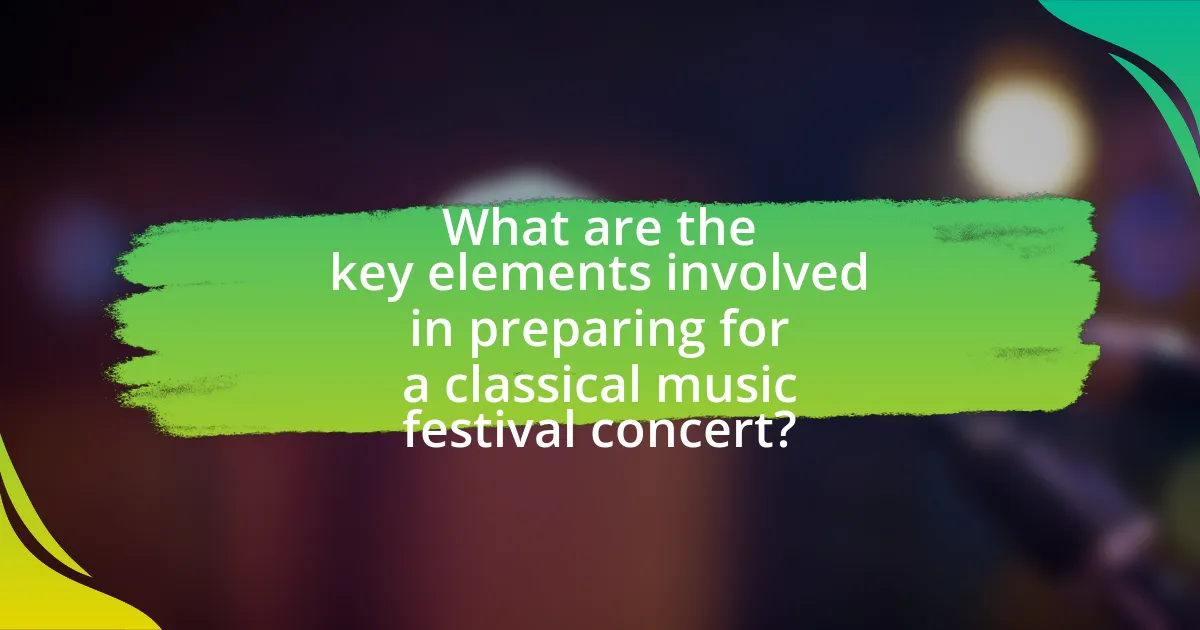
What are the key elements involved in preparing for a classical music festival concert?
The key elements involved in preparing for a classical music festival concert include venue selection, artist coordination, program planning, logistics management, and audience engagement strategies. Venue selection ensures the space accommodates the expected audience size and provides suitable acoustics, which is critical for classical performances. Artist coordination involves scheduling rehearsals and ensuring that musicians have the necessary resources, such as instruments and sheet music. Program planning requires curating a balanced repertoire that appeals to the audience while showcasing the artists’ strengths. Logistics management encompasses sound and lighting setup, ticketing, and transportation arrangements for performers and equipment. Finally, audience engagement strategies, such as marketing and outreach, are essential to attract attendees and enhance their concert experience. Each of these elements is vital for a successful classical music festival concert, as they collectively contribute to the overall quality and enjoyment of the event.
How do venue selection and logistics impact the concert preparation?
Venue selection and logistics significantly impact concert preparation by determining the feasibility, audience experience, and operational efficiency of the event. The choice of venue affects acoustics, capacity, and accessibility, which are crucial for delivering a high-quality performance. For instance, a venue with poor acoustics can diminish sound quality, while an inadequate capacity may lead to overcrowding or underwhelming attendance. Additionally, logistical considerations such as transportation, setup time, and technical requirements influence the overall timeline and resource allocation for the concert. Efficient logistics ensure that equipment is delivered on time and that the setup aligns with the performance schedule, minimizing delays and enhancing the audience’s experience.
What factors should be considered when choosing a venue for the concert?
When choosing a venue for a concert, key factors include location, capacity, acoustics, and amenities. The location should be accessible to the target audience, ideally near public transportation and parking options. Capacity must align with expected attendance to ensure a comfortable experience without overcrowding. Acoustics are crucial for sound quality; venues designed for music performances typically offer superior acoustics. Amenities such as restrooms, concessions, and technical support enhance the overall experience for both performers and attendees. These considerations ensure a successful concert that meets the needs of the audience and performers alike.
How does the location influence audience attendance and experience?
The location significantly influences audience attendance and experience by affecting accessibility, ambiance, and cultural relevance. For instance, a venue situated in a city center is likely to attract more attendees due to ease of access via public transportation and proximity to accommodations. Additionally, the ambiance created by the location, such as historical significance or natural beauty, enhances the overall experience, making it more memorable. Research indicates that events held in culturally rich environments can increase audience engagement and satisfaction, as seen in studies conducted by the National Endowment for the Arts, which highlight the correlation between venue characteristics and audience enjoyment.
What role do musicians and performers play in the preparation process?
Musicians and performers play a crucial role in the preparation process for a classical music festival concert by contributing their artistic skills and collaborative efforts. They engage in rehearsals to refine their performances, ensuring that they align with the conductor’s vision and the overall program. Additionally, musicians are responsible for maintaining their instruments and preparing their individual parts, which is essential for achieving a cohesive sound during the concert. Their commitment to practice and teamwork directly impacts the quality of the performance, as evidenced by studies showing that ensemble rehearsals significantly enhance musical cohesion and performance outcomes.
How are musicians selected for the festival concert?
Musicians are selected for the festival concert through a combination of auditions, recommendations, and evaluations of their previous performances. The selection process typically involves a panel of judges who assess the musicians’ technical skills, artistry, and suitability for the specific repertoire of the festival. For instance, many festivals require musicians to submit recordings or perform live auditions, which are then critiqued based on established criteria such as tone quality, rhythm, and expression. This structured approach ensures that only the most qualified musicians are chosen to participate in the concert.
What are the rehearsal requirements for performers before the concert?
Performers are typically required to attend multiple rehearsals before a concert to ensure cohesion and readiness. These rehearsals often include individual practice sessions, group rehearsals, and dress rehearsals. Individual practice allows performers to master their parts, while group rehearsals focus on ensemble playing and synchronization. Dress rehearsals simulate the concert environment, allowing performers to adjust to stage dynamics and acoustics. Research indicates that consistent rehearsal improves performance quality, as evidenced by studies showing that musicians who rehearse together regularly exhibit better timing and musicality.
How does marketing and promotion contribute to the success of the concert?
Marketing and promotion are crucial for the success of a concert as they drive audience awareness and ticket sales. Effective marketing strategies, such as targeted advertising and social media campaigns, create buzz and attract potential attendees. For instance, a study by the National Endowment for the Arts found that 70% of concertgoers learned about events through online promotions. Additionally, promotional partnerships with local businesses can enhance visibility and reach, further increasing attendance. Therefore, a well-executed marketing and promotion plan directly correlates with higher concert turnout and overall success.
What strategies are effective for promoting a classical music festival concert?
Effective strategies for promoting a classical music festival concert include leveraging social media marketing, collaborating with local influencers, and utilizing targeted email campaigns. Social media platforms like Facebook and Instagram allow for visually engaging content that can reach a broad audience, while collaborations with local influencers can enhance credibility and attract their followers. Targeted email campaigns can directly reach potential attendees who have shown interest in similar events, increasing the likelihood of ticket sales. According to a study by Eventbrite, 62% of event attendees discover events through social media, highlighting its effectiveness as a promotional tool.
How can social media be utilized to engage potential audiences?
Social media can be utilized to engage potential audiences by creating interactive content that resonates with their interests and preferences. For instance, platforms like Instagram and Facebook allow for live Q&A sessions, behind-the-scenes footage, and interactive polls, which foster a sense of community and involvement. Research indicates that posts with visual content receive 94% more views than text-only posts, highlighting the effectiveness of engaging visuals in attracting audience attention. Additionally, targeted advertising on social media can reach specific demographics, ensuring that promotional content is seen by those most likely to attend the concert.
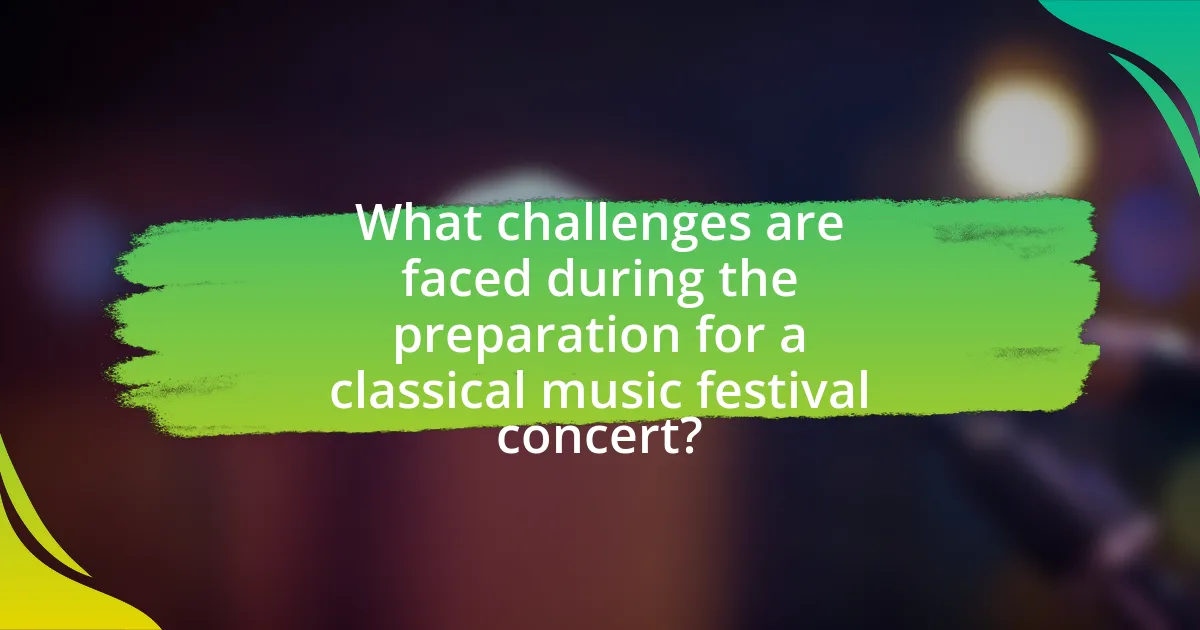
What challenges are faced during the preparation for a classical music festival concert?
The challenges faced during the preparation for a classical music festival concert include logistical coordination, funding issues, and artist management. Logistical coordination involves scheduling rehearsals, securing venues, and arranging transportation for musicians and instruments, which can be complex due to varying availability and technical requirements. Funding issues often arise as securing sponsorships and ticket sales is crucial for covering costs, and financial shortfalls can jeopardize the event. Artist management entails negotiating contracts, ensuring artists’ needs are met, and managing their schedules, which can be challenging given the diverse backgrounds and expectations of performers. These factors collectively contribute to the difficulties encountered in organizing a successful classical music festival concert.
How can budget constraints affect concert planning?
Budget constraints significantly impact concert planning by limiting the resources available for various aspects of the event. These financial limitations can lead to reduced artist fees, which may result in less popular performers being booked, ultimately affecting audience turnout. Additionally, budget constraints can restrict venue choices, forcing planners to select less desirable locations that may not meet the desired acoustics or capacity, thereby diminishing the overall concert experience. Furthermore, limited budgets can curtail marketing efforts, leading to lower visibility and attendance. According to a study by the National Endowment for the Arts, events with robust marketing budgets see up to 30% higher attendance rates compared to those with minimal promotion, highlighting the critical role of financial resources in successful concert planning.
What are common budgetary challenges in organizing a music festival?
Common budgetary challenges in organizing a music festival include high costs for talent booking, venue rental, and production expenses. Talent booking often requires significant upfront payments, which can strain budgets, especially if ticket sales do not meet expectations. Venue rental costs can vary widely based on location and capacity, impacting overall financial planning. Additionally, production expenses, including sound, lighting, and staging, can escalate quickly, leading to potential budget overruns. According to a report by the Eventbrite team, 60% of event organizers cite budget management as a primary concern, highlighting the importance of careful financial planning in festival organization.
How can organizers effectively manage costs without compromising quality?
Organizers can effectively manage costs without compromising quality by implementing strategic budgeting and prioritizing essential expenditures. By conducting a thorough analysis of all potential costs and identifying areas where expenses can be minimized, such as negotiating contracts with vendors or utilizing local talent, organizers can maintain high standards while reducing financial strain. For instance, a study by the National Endowment for the Arts found that festivals that focused on community engagement and local partnerships were able to reduce costs by up to 30% while enhancing the overall experience for attendees. This approach not only preserves quality but also fosters a sense of community involvement and support.
What logistical issues may arise in the lead-up to the concert?
Logistical issues that may arise in the lead-up to the concert include transportation delays, equipment malfunctions, and insufficient staffing. Transportation delays can occur due to traffic congestion or vehicle breakdowns, impacting the timely arrival of musicians and instruments. Equipment malfunctions may arise from technical failures in sound systems or lighting, which can disrupt rehearsals and performances. Insufficient staffing can lead to inadequate support for setup, ticketing, and crowd management, resulting in operational inefficiencies. These issues can significantly affect the overall success of the concert and require careful planning and contingency measures to mitigate their impact.
How can weather conditions impact outdoor festival concerts?
Weather conditions can significantly impact outdoor festival concerts by affecting attendance, performance quality, and safety. For instance, adverse weather such as rain or extreme heat can deter attendees, leading to lower ticket sales and reduced audience engagement. A study by the National Oceanic and Atmospheric Administration (NOAA) indicates that severe weather events can decrease attendance by up to 30%. Additionally, weather can influence the performance itself; high winds can disrupt sound quality and equipment stability, while rain can damage instruments and pose safety risks for performers and attendees alike. Historical data from outdoor concerts shows that events held during inclement weather often face logistical challenges, including delays and cancellations, further underscoring the critical role of weather in the success of outdoor festivals.
What contingency plans should be in place for unexpected challenges?
Contingency plans for unexpected challenges at a classical music festival concert should include backup performance venues, alternative transportation arrangements for artists, and emergency medical services on-site. These measures ensure that if the primary venue becomes unavailable due to unforeseen circumstances, such as weather or technical issues, the concert can still proceed smoothly. Historical data from events like the 2017 Glastonbury Festival, which faced severe weather, highlights the importance of having alternative plans in place, as they successfully relocated performances to sheltered areas, minimizing disruption. Additionally, having a dedicated team for crisis management can facilitate quick decision-making and communication, further enhancing the festival’s resilience against unexpected challenges.
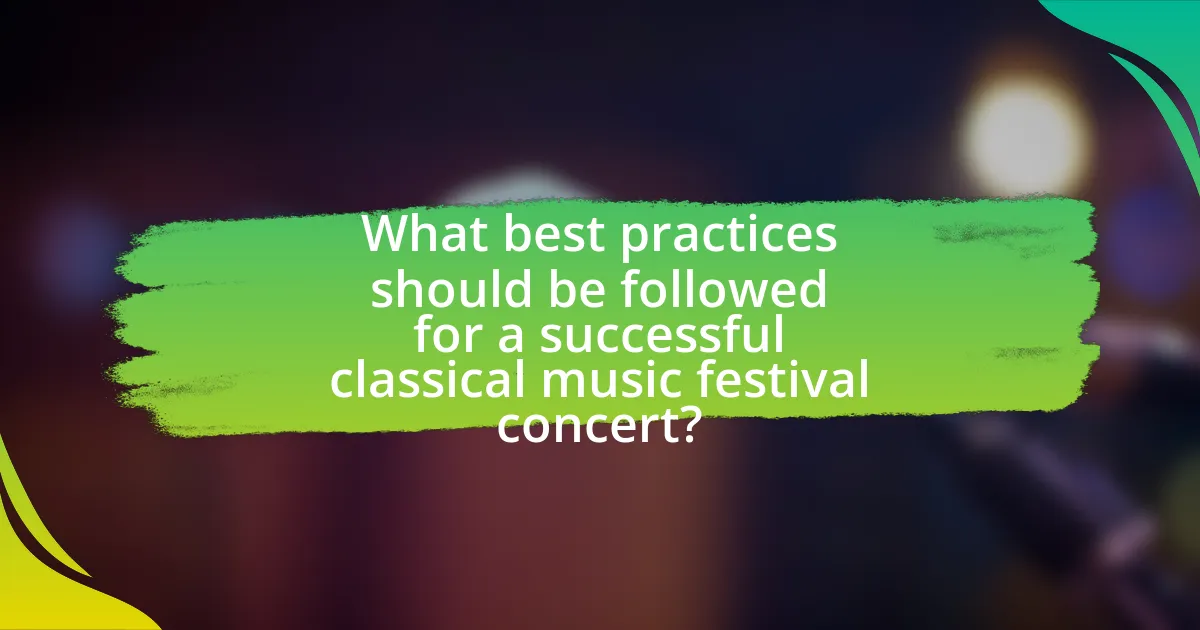
What best practices should be followed for a successful classical music festival concert?
To ensure a successful classical music festival concert, organizers should prioritize meticulous planning, effective communication, and audience engagement. Meticulous planning involves securing a suitable venue, scheduling rehearsals, and coordinating logistics such as sound equipment and seating arrangements. Effective communication among musicians, staff, and volunteers is crucial for smooth operations, as it minimizes misunderstandings and ensures everyone is aligned with the concert’s goals. Audience engagement can be enhanced through marketing strategies that highlight the festival’s unique offerings, such as artist bios and program notes, which foster a deeper connection with attendees. These practices are supported by industry standards, which emphasize the importance of preparation and collaboration in delivering high-quality performances.
How can effective communication enhance the preparation process?
Effective communication enhances the preparation process by ensuring that all team members are aligned on goals, tasks, and timelines. Clear dialogue facilitates the sharing of critical information, such as scheduling rehearsals, coordinating logistics, and addressing any potential issues that may arise. For instance, a study published in the Journal of Business Communication found that organizations with strong communication practices experience a 25% increase in productivity, which directly impacts the efficiency of preparation efforts. This alignment minimizes misunderstandings and fosters collaboration, ultimately leading to a more successful event execution.
What tools can be used to facilitate communication among the team?
Effective tools for facilitating communication among the team include project management software, messaging platforms, and video conferencing tools. Project management software like Trello or Asana allows team members to track tasks and deadlines collaboratively, ensuring everyone is aligned on responsibilities. Messaging platforms such as Slack or Microsoft Teams enable real-time communication, making it easy to share updates and discuss issues instantly. Video conferencing tools like Zoom or Google Meet facilitate face-to-face interactions, which are crucial for discussing complex topics or brainstorming ideas. These tools enhance collaboration and streamline communication, essential for the successful preparation of a classical music festival concert.
How important is regular feedback during the preparation phase?
Regular feedback during the preparation phase is crucial for ensuring the success of a classical music festival concert. It allows performers and organizers to identify areas for improvement, refine their skills, and enhance overall performance quality. Studies show that consistent feedback can lead to a 20% increase in performance effectiveness, as it fosters a culture of continuous improvement and accountability among team members. This iterative process helps in addressing potential issues early, ultimately contributing to a more polished and cohesive concert experience.
What tips can ensure a smooth concert day experience?
To ensure a smooth concert day experience, arrive early to allow ample time for parking, security checks, and finding your seat. Arriving at least one hour before the concert starts minimizes stress and ensures you can enjoy pre-concert activities. Additionally, familiarize yourself with the venue layout and any specific entry requirements, as this can prevent confusion and delays. Having your tickets ready, whether printed or on a mobile device, streamlines the entry process. Lastly, check the weather and dress appropriately, as comfort can significantly enhance your overall experience.
How should the schedule be organized for the day of the concert?
The schedule for the day of the concert should be organized into specific time blocks for rehearsals, sound checks, and performances. Each section of the day must be clearly defined to ensure smooth transitions and adequate preparation time. For example, allocate the morning for final rehearsals, followed by a designated time for sound checks in the early afternoon. The concert should begin at a set time, allowing for a pre-concert briefing with the performers and staff. This structured approach minimizes confusion and maximizes efficiency, as seen in successful concert events where detailed scheduling has led to timely performances and satisfied audiences.
What are the best practices for managing audience flow and safety?
The best practices for managing audience flow and safety include implementing clear signage, trained staff, and effective crowd control measures. Clear signage helps direct attendees to entrances, exits, and facilities, reducing confusion and potential bottlenecks. Trained staff can monitor crowd dynamics and assist in emergency situations, ensuring a quick response to any incidents. Effective crowd control measures, such as designated pathways and barriers, help maintain orderly movement and prevent overcrowding in specific areas. According to the National Fire Protection Association, proper crowd management can significantly reduce the risk of accidents and enhance overall safety at events.
What are the key takeaways for future concert preparations?
Key takeaways for future concert preparations include thorough planning, effective communication, and logistical coordination. Thorough planning ensures that all aspects, such as venue selection, scheduling, and artist availability, are addressed well in advance, minimizing last-minute issues. Effective communication among team members, including artists, technicians, and management, fosters collaboration and clarity, which is essential for a successful event. Logistical coordination, including sound checks, equipment setup, and audience management, is crucial to ensure a seamless experience for both performers and attendees. Historical data from past events indicates that meticulous attention to these areas significantly enhances overall concert success and audience satisfaction.
